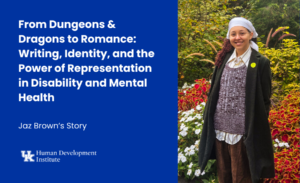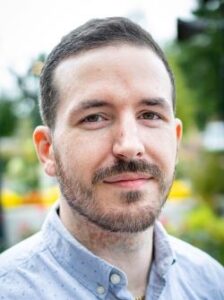“I think the first stuff I ever really wrote were backgrounds for my D&D character when I was in high school,” Jaz Brown said.
As a fellow pen and paper role-playing game (RPG) enthusiast who likewise enjoys a detailed backstory, I can understand that. I came to writing through a different pathway, but still ended up in the same place when I started playing tabletop RPGs. That lends itself something Brown and I have in common—we believe what makes a story memorable is the characters. That’s what led Brown to one of their favorite genres to write: romance.
As someone who doesn’t read or write a lot of romance, I was interested in what drew them to the genre. They told me that it’s a unique pressure cooker that forces powerful character growth. The genre offers a very clear map of what to expect to its readers, but there is a lot of variety of how those can be expressed.
“I’m going to get a couple. They’re going to be perfect for each other. They’re probably not going to know it yet. And we’re going to solve interpersonal conflicts and have character growth in order to reach a happy ending,” Brown said, adding that they read a lot of 90s fantasy and loved it, but eventually found the sameness of it stale. “They’re all the same main character who gets the same blond, long haired girl and he does the same hero’s journey plot. And I just got really tired of it. But with romance, you can do romance in any genre, and it is pretty much the standard for anything. Combining romance and fantasy together, that’s my favorite.”
After all, Brown and I agreed there’s nothing wrong with a story hitting well-trod ground if it does it well. It goes back to characters; stories often live and die on that character development. As a fantasy writer, I don’t always include romantic subplots, but characters are often a huge focus of my writing process. One of the most important pieces of writing advice I ever received was to think of character flaws less as traits and more as ideas, a lie the character believes, and then build the story around disproving that lie.
Brown, meanwhile, focuses a lot on dialogue in their writing. After all, romance is often built around two characters talking a lot, and when those characters talk, it needs to be engaging.
Creative writing brings freedom and opportunities to explore your identity and place within the world. Brown and I both use our writing to freely engage with our interests. Brown is very interested in vampires and they show up a lot in their work. Likewise, I write a lot of fantasy involving early industrial technology because I have a thing for that era of history. And in terms of identity, we’ve both learned and explored aspects of ourselves through our writing. I catch myself accidentally creating characters with autistic traits all the time, and Brown has found fascinating ways in which vampires, a longtime special interest of theirs, relate to autism.
“Vampires are often fish out of water types whose ideas transcend place and time. To me, that has always read as a little autistic or at least neurodivergent. Not to mention tropes like a food aversion to garlic and enjoying counting things,” they said. “They have a history of being the foreigner, the outcast, and the disabled in literature, and yet they are still regarded mostly as desirable. I think that’s a fun theme and part of the reason why they are my primary special interest.”
Writing can be used to explore, confront, and abstract emotions that are difficult to confront directly. Though it’s not a substitute for therapy or other forms of treatment, I can definitely say it’s been good for my mental health. Good storytelling helps others empathize with experiences they’re unfamiliar with, including mental health. Though mental health is often depicted poorly, a well-imagined, thoughtful, and well-researched depiction can have a profound impact on how its viewers understand it. This is something Brown is researching through their ongoing project analyzing how mental health concerns are represented in Tabletop RPGs.
Brown and I both have gotten a lot out of creative writing and have exciting plans for the future. They’ve been getting more and more into academic writing and have considered writing video essays in the future. Meanwhile, I’m working on a second novel that I hope to finish this year. For us, it’s not just a part of who we are, it’s a part of how we see the world, how we understand each other, and how we understand ourselves. Writing isn’t just a thing we do, it’s a part of who we are.



